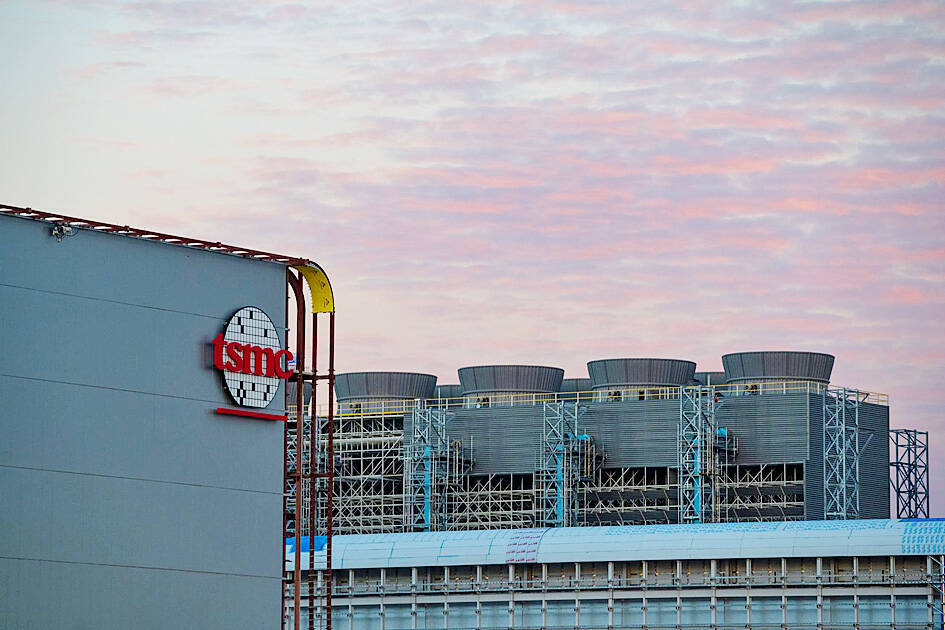Taiwan Semiconductor Manufacturing Co (TSMC, 台積電) has announced that its Arizona subsidiary will expand its apprenticeship program to include more aspects of the manufacturing process.
Originally opening apprenticeships for facilities technicians, TSMC Arizona will begin recruiting trainee equipment technicians, process technicians and manufacturing technician specialists, according to the world’s largest contract chip maker.
By next year, a total of 130 full-time registered apprentices are expected to participate in TSMC Arizona’s Registered Technician Apprenticeship program, in addition to the eight facilities technician apprentices who joined in April this year, TSMC said.

Photo: Bloomberg
Under the program, described as “the first of its kind in Arizona” by local media, 80 apprentices were originally to be trained over five years.
The training program is expected to be completed in about 18 to 24 months for each apprentice after which they can decide whether or not to continue pursuing a career in TSMC Arizona, the company said.
TSMC Arizona is investing more than US$5 million in the programs, including on-the-job training hours and tuition support for the apprentice employees.
TSMC Arizona president Rose Castanares said that the apprentices will have the chance to obtain certifications or technician credentials, as well as an optional associate degree, according to a news report by the Arizona Commerce Authority.
The Arizona Commerce Authority is an economic development organization overseen by public-private sector board of directors.
“One of the top considerations in TSMC’s decision to expand here was the opportunity to tap a local and diverse talent pipeline and collaborate with a world-class US education system,” Castanares was quoted as saying.

When an apartment comes up for rent in Germany’s big cities, hundreds of prospective tenants often queue down the street to view it, but the acute shortage of affordable housing is getting scant attention ahead of today’s snap general election. “Housing is one of the main problems for people, but nobody talks about it, nobody takes it seriously,” said Andreas Ibel, president of Build Europe, an association representing housing developers. Migration and the sluggish economy top the list of voters’ concerns, but analysts say housing policy fails to break through as returns on investment take time to register, making the

‘SILVER LINING’: Although the news caused TSMC to fall on the local market, an analyst said that as tariffs are not set to go into effect until April, there is still time for negotiations US President Donald Trump on Tuesday said that he would likely impose tariffs on semiconductor, automobile and pharmaceutical imports of about 25 percent, with an announcement coming as soon as April 2 in a move that would represent a dramatic widening of the US leader’s trade war. “I probably will tell you that on April 2, but it’ll be in the neighborhood of 25 percent,” Trump told reporters at his Mar-a-Lago club when asked about his plan for auto tariffs. Asked about similar levies on pharmaceutical drugs and semiconductors, the president said that “it’ll be 25 percent and higher, and it’ll

CHIP BOOM: Revenue for the semiconductor industry is set to reach US$1 trillion by 2032, opening up opportunities for the chip pacakging and testing company, it said ASE Technology Holding Co (日月光投控), the world’s largest provider of outsourced semiconductor assembly and test (OSAT) services, yesterday launched a new advanced manufacturing facility in Penang, Malaysia, aiming to meet growing demand for emerging technologies such as generative artificial intelligence (AI) applications. The US$300 million facility is a critical step in expanding ASE’s global footprint, offering an alternative for customers from the US, Europe, Japan, South Korea and China to assemble and test chips outside of Taiwan amid efforts to diversify supply chains. The plant, the company’s fifth in Malaysia, is part of a strategic expansion plan that would more than triple

Taiwanese artificial intelligence (AI) server makers are expected to make major investments in Texas in May after US President Donald Trump’s first 100 days in office and amid his rising tariff threats, Taiwan Electrical and Electronic Manufacturers’ Association (TEEMA, 台灣電子電機公會) chairman Richard Lee (李詩欽) said yesterday. The association led a delegation of seven AI server manufacturers to Washington, as well as the US states of California, Texas and New Mexico, to discuss land and tax issues, as Taiwanese firms speed up their production plans in the US with many of them seeing Texas as their top option for investment, Lee said. The